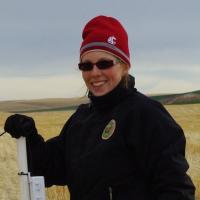
Research Focus:
High residue no-till using a stripper header to conserve soil moisture for planting of oilseeds.
Research Abstract:
The low-rainfall wheat production zone of Eastern Washington is plagued by wind erosion due to its fine-textured soils, low soil organic matter content, and tillage-based summer fallow practices. Increasing residue cover of the soil surface has been shown to reduce wind speeds and reduce the risk of soil erosion. Annual spring cropping has been evaluated many times to replace the summer fallow period, without economic success due to non-competitive yields. We conducted a 4-year study at Ralston, WA to evaluate winter triticale biomass production, yield, and nutrient use efficiency, seed zone soil moisture during no-till fallow, and establishment of fall-seeded canola. Winter triticale produced more grain per pound of nitrogen fertilizer and per inch of soil water available than winter wheat, and overall yield was 30 to 80% greater than that of winter wheat. Full-height cereals produced 20 to 90% more biomass than their semi-dwarf counterparts. Stripper header triticale stubble maintained with no-till chemical fallow reduced average wind speed at the soil surface to less than one half of average wind speed recorded over reduced-tillage winter wheat fallow. Soil moisture in the 0 to 3-inch seed zone was greater and more uniform in stripper header no-till fallow than in reduced-tillage fallow. This maintenance of soil moisture was conducive to timely planting and establishment of fall-seeded canola, and led to greater crop establishment in no-till fallow.
Biography:
Born and raised in Western Washington, Lauren graduated from WSU with a BS in Agricultural and Food Systems in 2010. Following graduation she spent time working at Humboldt State University, the San Diego Zoo, and as a youth environmental educator in Seattle before returning to Pullman to join the REACCH project in 2012. After becoming acquainted with REACCH and learning about the research taking place at the Ralston Project, she decided to pursue a Master's degree in crop science, officially beginning in the fall of 2013.
Publications and Presentations:
Pan WL, LE Port, Y. Xiao, AI Bary and CG Cogger. 2017. Soil carbon and nitrogen fractionation balances during long-term biosolids applications. Soil Science Society of America Journal (in press). Available online doi: 10.2136/sssaj2017.03.0075
Young, F., L. Port, and W. Pan. 2016. Best Management Practices to Improve Low Rainfall Oilseed Production. In 2016 Dryland Field Day Abstracts: Highlights of Research Progress. Dept. of Crop and Soil Sciences Tech Report 16-1, WSU, Pullman, WA.

